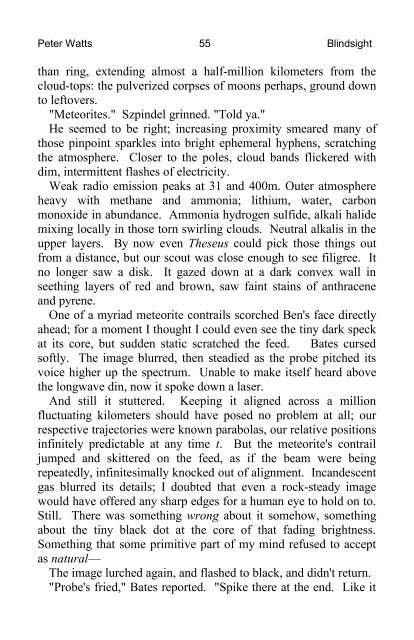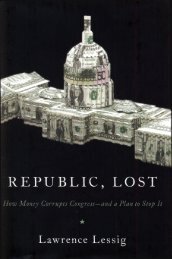- Page 4 and 5: Blindsight Peter Watts Prologue 6 T
- Page 6 and 7: Peter Watts 6 Blindsight Prologue "
- Page 8 and 9: Peter Watts 8 Blindsight yelped and
- Page 10 and 11: Peter Watts 10 Blindsight enemies,
- Page 12 and 13: Peter Watts 12 Blindsight "Blood ma
- Page 14 and 15: Peter Watts 14 Blindsight insensate
- Page 16 and 17: Peter Watts 16 Blindsight Sarasti.
- Page 18 and 19: Peter Watts 18 Blindsight briefly c
- Page 20 and 21: Peter Watts 20 Blindsight the ship
- Page 22 and 23: Peter Watts 22 Blindsight the remai
- Page 24 and 25: Peter Watts 24 Blindsight I even su
- Page 26 and 27: Peter Watts 26 Blindsight For perha
- Page 28 and 29: Peter Watts 28 Blindsight life. Ima
- Page 30 and 31: Peter Watts 30 Blindsight group of
- Page 32 and 33: Peter Watts 32 Blindsight (But wher
- Page 34 and 35: Peter Watts 34 Blindsight "What" "A
- Page 36 and 37: Peter Watts 36 Blindsight conventio
- Page 38 and 39: Peter Watts 38 Blindsight joyously
- Page 40 and 41: Peter Watts 40 Blindsight Theseus c
- Page 42 and 43: Peter Watts 42 Blindsight ship caug
- Page 44 and 45: Peter Watts 44 Blindsight well." Sh
- Page 46 and 47: Peter Watts 46 Blindsight He laughe
- Page 48 and 49: Peter Watts 48 Blindsight He let th
- Page 50 and 51: Peter Watts 50 Blindsight indirect,
- Page 52 and 53: Peter Watts 52 Blindsight basic pri
- Page 56 and 57: Peter Watts 56 Blindsight hit a Par
- Page 58 and 59: Peter Watts 58 Blindsight Szpindel
- Page 60 and 61: Peter Watts 60 Blindsight Sarasti c
- Page 62 and 63: Peter Watts 62 Blindsight effective
- Page 64 and 65: Peter Watts 64 Blindsight been enou
- Page 66 and 67: Peter Watts 66 Blindsight Or suppos
- Page 68 and 69: Peter Watts 68 Blindsight "They're
- Page 70 and 71: Peter Watts 70 Blindsight Smart eno
- Page 72 and 73: Peter Watts 72 Blindsight And thus
- Page 74 and 75: Peter Watts 74 Blindsight "Watch."
- Page 76 and 77: Peter Watts 76 Blindsight nine klic
- Page 78 and 79: Peter Watts 78 Blindsight IS DANGER
- Page 80 and 81: Peter Watts 80 Blindsight facility
- Page 82 and 83: Peter Watts 82 Blindsight expect us
- Page 84 and 85: Peter Watts 84 Blindsight explained
- Page 86 and 87: Peter Watts 86 Blindsight "Empathy
- Page 88 and 89: Peter Watts 88 Blindsight Whatever
- Page 90 and 91: Peter Watts 90 Blindsight determini
- Page 92 and 93: Peter Watts 92 Blindsight bright to
- Page 94 and 95: Peter Watts 94 Blindsight I knew al
- Page 96 and 97: Peter Watts 96 Blindsight "It hides
- Page 98 and 99: Peter Watts 98 Blindsight "Rorschac
- Page 100 and 101: Peter Watts 100 Blindsight sailed p
- Page 102 and 103: Peter Watts 102 Blindsight somehow
- Page 104 and 105:
Peter Watts 104 Blindsight "They do
- Page 106 and 107:
Peter Watts 106 Blindsight back int
- Page 108 and 109:
Peter Watts 108 Blindsight "I guess
- Page 110 and 111:
Peter Watts 110 Blindsight "Underst
- Page 112 and 113:
Peter Watts 112 Blindsight urged hi
- Page 114 and 115:
Peter Watts 114 Blindsight
- Page 116 and 117:
Peter Watts 116 Blindsight "Mothers
- Page 118 and 119:
Peter Watts 118 Blindsight "Helen,
- Page 120 and 121:
Peter Watts 120 Blindsight Taking m
- Page 122 and 123:
Peter Watts 122 Blindsight helicall
- Page 124 and 125:
Peter Watts 124 Blindsight Szpindel
- Page 126 and 127:
Peter Watts 126 Blindsight advantag
- Page 128 and 129:
Peter Watts 128 Blindsight I realiz
- Page 130 and 131:
Peter Watts 130 Blindsight bumping
- Page 132 and 133:
Peter Watts 132 Blindsight I jammed
- Page 134 and 135:
Peter Watts 134 Blindsight stuck to
- Page 136 and 137:
Peter Watts 136 Blindsight know wha
- Page 138 and 139:
Peter Watts 138 Blindsight BONDFAST
- Page 140 and 141:
Peter Watts 140 Blindsight trembled
- Page 142 and 143:
Peter Watts 142 Blindsight The tent
- Page 144 and 145:
Peter Watts 144 Blindsight fate. We
- Page 146 and 147:
Peter Watts 146 Blindsight head and
- Page 148 and 149:
Peter Watts 148 Blindsight "The one
- Page 150 and 151:
Peter Watts 150 Blindsight "Oh. Nah
- Page 152 and 153:
Peter Watts 152 Blindsight games. T
- Page 154 and 155:
Peter Watts 154 Blindsight her, the
- Page 156 and 157:
Peter Watts 156 Blindsight Three ye
- Page 158 and 159:
Peter Watts 158 Blindsight develop
- Page 160 and 161:
Peter Watts 160 Blindsight Agnosias
- Page 162 and 163:
Peter Watts 162 Blindsight her pist
- Page 164 and 165:
Peter Watts 164 Blindsight point. "
- Page 166 and 167:
Peter Watts 166 Blindsight and I fo
- Page 168 and 169:
Peter Watts 168 Blindsight I nodded
- Page 170 and 171:
Peter Watts 170 Blindsight most of
- Page 172 and 173:
Peter Watts 172 Blindsight twisted
- Page 174 and 175:
Peter Watts 174 Blindsight extrudin
- Page 176 and 177:
Peter Watts 176 Blindsight flawed,
- Page 178 and 179:
Peter Watts 178 Blindsight "Thirty-
- Page 180 and 181:
Peter Watts 180 Blindsight shadows,
- Page 182 and 183:
Peter Watts 182 Blindsight As much
- Page 184 and 185:
Peter Watts 184 Blindsight no uncer
- Page 186 and 187:
Peter Watts 186 Blindsight Coriolis
- Page 188 and 189:
Peter Watts 188 Blindsight "A distr
- Page 190 and 191:
Peter Watts 190 Blindsight anaerobi
- Page 192 and 193:
Peter Watts 192 Blindsight business
- Page 194 and 195:
Peter Watts 194 Blindsight "Jesus,
- Page 196 and 197:
Peter Watts 196 Blindsight My glass
- Page 198 and 199:
Peter Watts 198 Blindsight The scra
- Page 200 and 201:
Peter Watts 200 Blindsight Motion s
- Page 202 and 203:
Peter Watts 202 Blindsight Imagine
- Page 204 and 205:
Peter Watts 204 Blindsight keep it
- Page 206 and 207:
Peter Watts 206 Blindsight parallel
- Page 208 and 209:
Peter Watts 208 Blindsight It sound
- Page 210 and 211:
Peter Watts 210 Blindsight "Ants wa
- Page 212 and 213:
Peter Watts 212 Blindsight and coop
- Page 214 and 215:
Peter Watts 214 Blindsight Why shou
- Page 216 and 217:
Peter Watts 216 Blindsight to a saf
- Page 218 and 219:
Peter Watts 218 Blindsight "Indeed
- Page 220 and 221:
Peter Watts 220 Blindsight and awar
- Page 222 and 223:
Peter Watts 222 Blindsight doesn't
- Page 224 and 225:
Peter Watts 224 Blindsight a develo
- Page 226 and 227:
Peter Watts 226 Blindsight conduit,
- Page 228 and 229:
Peter Watts 228 Blindsight "You ask
- Page 230 and 231:
Peter Watts 230 Blindsight drives o
- Page 232 and 233:
Peter Watts 232 Blindsight with unp
- Page 234 and 235:
Peter Watts 234 Blindsight extent;
- Page 236 and 237:
Peter Watts 236 Blindsight cycle th
- Page 238 and 239:
Peter Watts 238 Blindsight like und
- Page 240 and 241:
Peter Watts 240 Blindsight Sarasti
- Page 242 and 243:
Peter Watts 242 Blindsight "There's
- Page 244 and 245:
Peter Watts 244 Blindsight was dark
- Page 246 and 247:
Peter Watts 246 Blindsight through
- Page 248 and 249:
Peter Watts 248 Blindsight billion
- Page 250 and 251:
Peter Watts 250 Blindsight surface:
- Page 252 and 253:
Peter Watts 252 Blindsight "So much
- Page 254 and 255:
Peter Watts 254 Blindsight breakthr
- Page 256 and 257:
Peter Watts 256 Blindsight say the
- Page 258 and 259:
Peter Watts 258 Blindsight adequate
- Page 260 and 261:
Peter Watts 260 Blindsight nowhere,
- Page 262 and 263:
Peter Watts 262 Blindsight be able
- Page 264 and 265:
Peter Watts 264 Blindsight to prove
- Page 266 and 267:
Peter Watts 266 Blindsight topology
- Page 268 and 269:
Peter Watts 268 Blindsight "You saw
- Page 270 and 271:
Peter Watts 270 Blindsight first-pe
- Page 272 and 273:
Peter Watts 272 Blindsight "It matt
- Page 274 and 275:
Peter Watts 274 Blindsight hostilit
- Page 276 and 277:
Peter Watts 276 Blindsight towards
- Page 278 and 279:
Peter Watts 278 Blindsight This sid
- Page 280 and 281:
Peter Watts 280 Blindsight afraid t
- Page 282 and 283:
Peter Watts 282 Blindsight into any
- Page 284 and 285:
Peter Watts 284 Blindsight a long,
- Page 286 and 287:
Peter Watts 286 Blindsight would sm
- Page 288 and 289:
Peter Watts 288 Blindsight get invo
- Page 290 and 291:
Peter Watts 290 Blindsight skimmers
- Page 292 and 293:
Peter Watts 292 Blindsight purple-f
- Page 294 and 295:
Peter Watts 294 Blindsight I turned
- Page 296 and 297:
Peter Watts 296 Blindsight "I saw s
- Page 298 and 299:
Peter Watts 298 Blindsight Sarasti'
- Page 300 and 301:
Peter Watts 300 Blindsight Charybdi
- Page 302 and 303:
Peter Watts 302 Blindsight I got a
- Page 304 and 305:
Peter Watts 304 Blindsight see her
- Page 306 and 307:
Peter Watts 306 Blindsight birthrig
- Page 308 and 309:
Peter Watts 308 Blindsight generall
- Page 310 and 311:
Peter Watts 310 Blindsight Homo sap
- Page 312 and 313:
Peter Watts 312 Blindsight visual c
- Page 314 and 315:
Peter Watts 314 Blindsight Others (
- Page 316 and 317:
Peter Watts 316 Blindsight used to
- Page 318 and 319:
Peter Watts 318 Blindsight The Game
- Page 320 and 321:
Peter Watts 320 Blindsight explaine
- Page 322 and 323:
Peter Watts 322 Blindsight interact
- Page 324 and 325:
Peter Watts 324 Blindsight Blindsig
- Page 326 and 327:
Peter Watts 326 Blindsight gorging
- Page 328 and 329:
Peter Watts 328 Blindsight great ap
- Page 330 and 331:
Peter Watts 330 Blindsight of metal
- Page 332 and 333:
Peter Watts 332 Blindsight consider
- Page 334 and 335:
Peter Watts 334 Blindsight a. You m
- Page 336 and 337:
Peter Watts 336 Blindsight entity,
- Page 338 and 339:
Peter Watts 338 Blindsight 6. Limit
- Page 340:
Peter Watts 340 Blindsight the Lice



